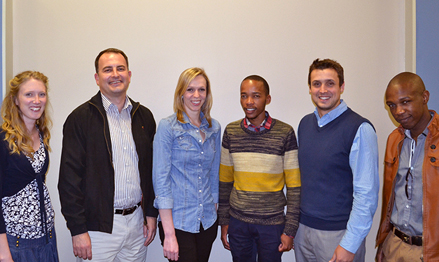Latest News Archive
Please select Category, Year, and then Month to display items
02 January 2025
|
Story Gerda-Marie van Rooyen
|
Photo Supplied
 Leading the research in South Africa is Prof Linus Franke from the Department of Soil, Crop and Climate Sciences.
Leading the research in South Africa is Prof Linus Franke from the Department of Soil, Crop and Climate Sciences.
Scientists are actively pursuing the successful breeding of diploid hybrid potatoes from inbred lines. This is expected to revolutionise potato breeding as it holds the key to rapid genetic progress. It will introduce new varieties for commercialisation through seed. Currently, existing potato variants have a gene that renders self-pollinated seeds infertile.
Prof Linus Franke, an academic in the Department of Soil, Crop and Climate Sciences at the UFS, is leading the research in South Africa. “This technology allows the production of genetically uniform potato seed that is easy to transport and largely disease-free.” He says this differs from conventional breeding whereby only vegetative propagation is possible due to tetraploid varieties in potatoes. It also risks carrying pests and diseases from one generation to the next – leading to the accumulation of pests and diseases with each round of multiplication.
Seed innovation
Prof Franke explains that Solynta BV, a seed company based in the Netherlands that produces potato varieties that can be grown from seed, has included South Africa in their research efforts because it is one of Africa’s largest producers and exporters. Through his academic relationship with Wageningen University and Research, a Dutch institution renowned for its agricultural endeavours and food production, the UFS became involved in researching hybrid potatoes grown from seed.
Diploid seeds containing two sets of chromosomes allow easier gene manipulation to increase predictability and speedier genetic progress. The breeding approach enables the incorporation of tolerance to pests, diseases, abiotic stresses (cold, heat, drought) and other desired genetic traits.
Although Prof Franke is optimistic about this research, he is not blind to disadvantages. “Potato seeds are tiny and have little energy reserves, making it harder to grow potatoes from seed than from tubers.” He says potatoes from seed will take longer to cultivate than tubers, as farmers need to grow plantlets from seeds first, adding six weeks to the growing period. “It is possible that commercial farmers can grow potatoes directly from seed. Alternatively, perhaps more likely, specialised growers will produce tubers of potatoes from seed; these tubers are then sold as seed tubers to other potato farmers, who then continue their normal practices of producing potatoes for the market from tubers.”
Financial benefits
Prof Franke says farmers have reason to get excited. “Seed potatoes will reduce input costs, as varieties with enhanced tolerance to pests and diseases require less pesticides. Planting one hectare of potatoes requires three to four tonnes of potato tubers, but only one 25 g packet of potato seeds.” Since potatoes are a more valuable commodity than maize, this technology might also increase farmers’ income potential.
UFS gets support for improving university access and success in South Africa
2013-10-24
|
 |
|
Members of the SASSE Research team are from left: Carike Jordaan, Dr Francois Strydom, Lana Swart, Seisho Gaboutlwelweboutlwelwakemo, Michael Henn en Katleho Nyaile.
Photo: Supplied
24 October 2013 |
The university’s Centre of Teaching and Learning (CTL) received a grant for US$820 000 (about R8 million) from the Kresge Foundation for their South African Survey of Student Engagement (SASSE) research team.
The SASSE research team is committed to furthering student access with success by promoting quality teaching and learning institutionally and promoting collective impact around student success nationally.
Through this three-year project, the SASSE team aims to provide a range of deeply contextualised and globally benchmarked student engagement measures that can be used at institutional and module/course level for the South African context. The data from these measures can be used to improve the quality of undergraduate teaching and learning, and participating institutions will have access to appropriate capacity development interventions to empower them to use the data to promote evidence-based change in their institutions.
Dr Francois Strydom, Academic Director at the CTL, says the lessons from this higher-education project could be used to develop a stronger post-school sector which could help the country to deal with the massive challenge of youth unemployment; thereby promoting equity, social justice and a prosperous democracy in South Africa.
The Kresge Foundation is a private philanthropic foundation in the United States, which is focused on creating opportunity for low-income people through various programmes. This three-year project forms part of the Kresge Foundation’s Education Programme, which focuses on promoting access and success at South African universities. Therefore the SASSE project aims to contribute to the Kresge-sponsored Access and Success in Higher Education in South Africa (ASHESA), to promote a national conversation on improving student success.
In January this year, the university was one of four South African universities selected to take part in a multi-million rand programme to bolster private fund-raising and advancement efforts. For this programme the UFS was granted US$640 000 (about R5,6 million) over a period of five years.